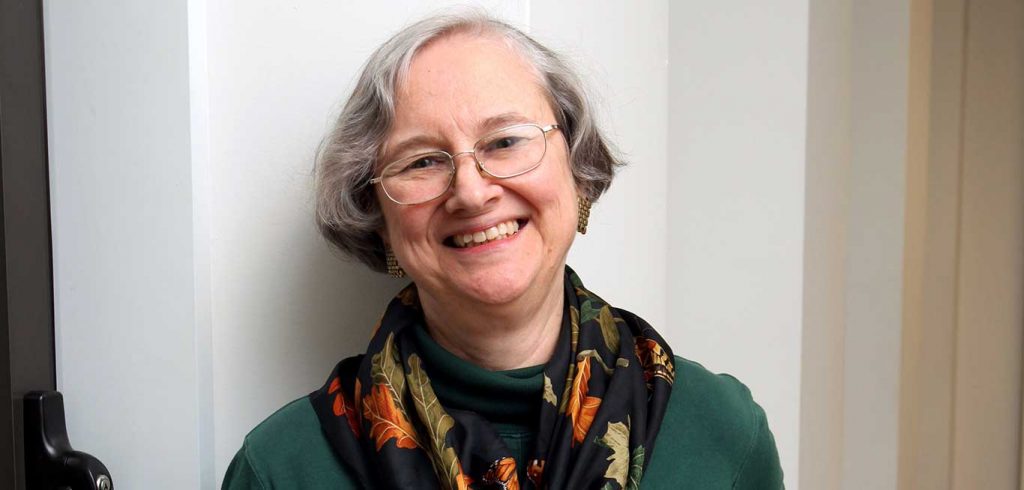Maureen Tilley, PhD, a professor of theology whose research on Christianity during the late antiquity era placed her among experts on the formation of the modern Catholic church, died on April 3 of pancreatic cancer.
“I was very saddened to hear about Dr. Tilley’s death,” said Joseph M. McShane, SJ, president of Fordham. “First and foremost, my heart goes out to Terry [her husband]and to their family. Many people can—and will—speak of Maureen’s exceptional scholarship and service to Fordham, but for my part, I will miss her as a friend, a colleague, and a woman of enormous decency and integrity. I know the University community joins me in keeping the Tilley family in our hearts and prayers today.”
Visitation will be held Monday, April 11 from 4:30 – 8 p.m. at St. Paul the Apostle Church, 405 W 59th St., New York, New York. A funeral mass will be held Tuesday, April 12, at 10 a.m. at St. Paul the Apostle Church.
Tilley came to Fordham in 2006 with her husband Terrence, Fordham’s Avery Cardinal Dulles, SJ, Professor of Catholic Theology and the former department chair. She had taught previously at Florida State University (1989-1998) and the University of Dayton (1998-2006). She was an internationally respected scholar of late ancient North African Christianity, between roughly the timespan of 180 A.D. to 700 A.D.
Martyrdom, the roles for women, ecclesiastical art, the veneration of saints, and the reception of biblical texts were all part of her studies. Of particular interest to her was the relationship between two prominent Christian communities of the era, the Catholics and the Donatists.
After a semester away from Fordham as the Thomas F. Martin St. Augustine Fellow at Villanova University, Tilley was promoted to full professor in 2011. In a 2012 profile in Inside Fordham, Tilley explained the significance of St. Augustine of Hippo, who worked to heal the rift between the Donatists, a group that advocated a smaller, purer, holier church.
“What Augustine is famous for is constructing a sacramental theology of baptism and penance that continues to the present,” Tilley said. “[This involves] finding a welcome for repentant sinners—not holding them at arm’s distance, but enfolding them—and having a greater tolerance for evil members of the church.”
J. Patrick Hornbeck II, DPhil, chair of the theology department, said that by illuminating the world of Augustine, Tilley helped people understand better what it meant for an early Christian to be called a saint, and what it means when people, especially women, are called saints today.
“She brought to her scholarship a tremendous care for detail and accuracy, an eagerness to delve into challenging texts, and a desire to leave scholarly tools for generations of church historians to come,” he said.
“Maureen was a distinguished colleague, a fellow student of the history of Christianity, but most of all, an exceptional and fiercely loyal friend. I will miss her wry sense of humor and her knack for not allowing our department or any of us to settle for second best,” Hornbeck said.
Tilley’s colleague, Distinguished Professor of Theology Elizabeth Johnson, PhD, said Tilley was part of the first generation of women scholars who brought a contemporary perspective to issues of systematic theology.
Sister Johnson said she uses Tilley’s “The Passion of Perpetua and Felicity,” from Searching the Scriptures: A Feminist Commentary, Vol. 2, (Crossroad Pub, 1994), in her classes to illustrate that women who were martyred for their refusal to marry wealthy men were not, as had been widely believed, concerned with preserving their virginity.
“What Maureen figured out from reading the texts was, they were rejecting patriarchal marriage; they wanted to have a life of their own, and Christ gave them that possibility,” she said.
Sister Johnson noted that even though Tilley was ill, she finished one last paper, “Class Conflict in the Convent: St. Caesarius of Arles and Unruly Nuns,” the subject of one of her earlier lectures. The paper details how Caesarius, a sixth-century bishop, dealt with a conflict between rich and poor nuns by issuing elaborate rules for stitching; the rule was designed to restrict the wealthier nuns’ ability to flaunt their class privilege. Sister Johnson said it exemplifies how Tilley saw value in areas that others might pass over.
“She had an eye for what doesn’t fit the standard judgment of what’s important or not important, and by pursuing those little ideas that are in the texts but overlooked by virtually everyone, she shed new light on the spirituality, theology, and the actual practiced religious life of people long gone,” she said.
Tilley was born in 1948 to Joe and Betty Molloy and raised in California, where she attended Catholic grammar and high schools in San Pedro. She earned a bachelor’s degree from the University of San Francisco in 1970, a master’s degree from St. Michael’s College in Vermont in 1985, and a doctorate degree in the history of Christianity from Duke University in 1989. She wrote more than 70 articles, 50 reviews, an influential monograph, The Bible in Christian North Africa (1997), two books of translations, and co-edited a volume of essays. She served on the editorial boards of Theological Studies and Horizons. She served as president of the North American Patristics Society (2005-06). She also had an interest in needlework; one of her projects hangs in the Holy Cross Church sanctuary in Durham, North Carolina.
Tilley is survived by her husband Terrence, daughters Elena DeStefano and Christine Dyer, granddaughter Jacqueline Dyer, and sisters Noelle Gervais and Josette Molloy.
In lieu of flowers, a donation to Mary’s Pence or a “peace and justice” charity is encouraged.

